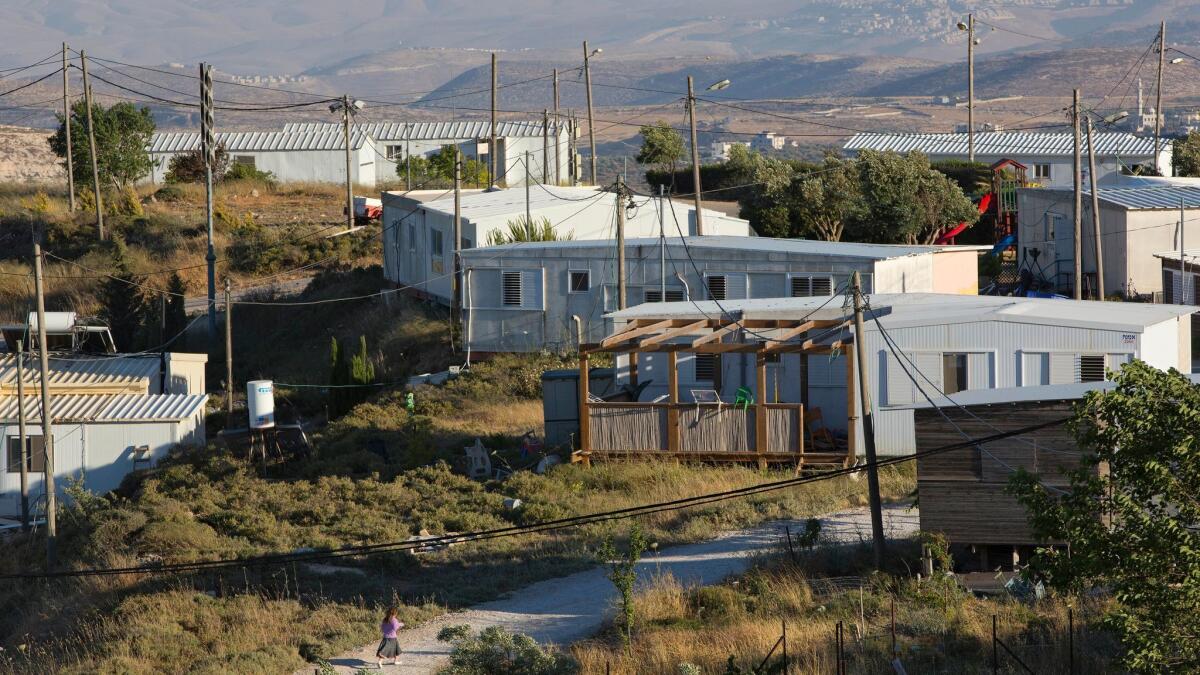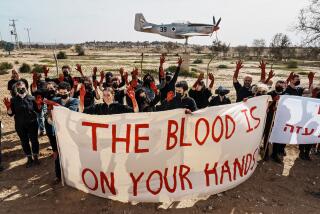Editorial: Israel’s ‘muezzin law’ would muffle the call to prayer

Is anyone surprised that Israel’s parliament is seeking to legalize thousands of homes built without authorization by settlers on privately owned land in the occupied West Bank? They shouldn’t be. The ex-post-facto approval is in line with 50 years of settlement building and expansion, which have continued steadily since the Six Day War under governments of both the right and the left.
The current bill, sponsored by Naftali Bennett, leader of the conservative Jewish Home party, has received preliminary approval in the Knesset — but should be rejected when it comes back to the floor. The retroactive legalization of illegal homes for Israelis on Palestinian-owned land threatens the viability of the two-state solution, which admittedly is nearly moribund but which remains the only realistic hope for peace. As Israel continues to transform the map of the West Bank by changing the “facts on the ground,” the conflict becomes increasingly difficult to unwind. The latest bill is a distressing development.
Israel already has laws on the books to deal with excessive noise — laws which set objective standards... Perhaps it should enforce those.
But it is a predictable one. That’s why it was just as disturbing in some ways to learn this week that the Israeli parliament is moving forward on what is known as the “muezzin bill.” The muezzin is the person at a mosque who recites the call to prayer. The muezzin’s chant, generally broadcast over a loudspeaker from the mosque’s minaret, is a familiar sound throughout the Islamic world, from the giant mosques of Cairo, Istanbul and Baghdad to the smaller ones in towns and villages in every Arab country. It is a haunting, centuries-old symbol of Islam.
The call to prayer can also be loud and, no doubt, annoying. It occurs five times a day, including a first call before dawn. Under the “muezzin bill,” backed by Prime Minister Benjamin Netanyahu and endorsed by his cabinet, the government would be allowed to ban the use of loudspeakers at mosques in Israel (and at other houses of worship, although no one has identified a problem at synagogues or churches).
According to the bill’s supporters, the goal is not to trample on the rights of Palestinians, insult Islam or “Judaize” mixed cities, but to “prevent people’s sleep from being disturbed,” as one Knesset member put it. Jews who choose to live close to Arab neighborhoods have complained for years about the noise, the bill’s proponents say, yet Israeli authorities have not tried to enforce existing noise pollution statutes against mosques.
About 20% of people living in Israel are Arabs, and 83% of the Arabs are Muslim.
On the one hand, the damage done by this bill would be more symbolic than substantive. After all, several European countries have already taken steps to restrict the call to prayer. Governments are expected to balance the respective rights of all the people in a community.
Yet it’s easy to see this will not end happily. Instead of trying to work out a reasonable, mutually agreeable modus vivendi in mixed-population cities like Jerusalem and Haifa and Lod, the Knesset is poised to adopt a harsh and provocative approach that will deepen the conflict. It’s obviously difficult to avoid creating bad feeling when one community’s fundamental and centuries-old religious practice is dismissed by its neighbors as “noise pollution.” Especially when those neighbors hold the overwhelming share of political power.
Besides, Israel already has laws on the books to deal with excessive noise — laws which set objective standards that can be applied across the board to restrict high-decibel factories, loud nighttime revelers and other such irritants. Perhaps it should enforce those rather than creating a law authorizing an out-and-out ban on loudspeakers that is specifically targeted (despite some thinly veiled language to the contrary) at Muslims and their mosques.
Sadly, sensitivity and compromise are not in vogue in the region these days. Instead, Palestinians stab Jews on the streets, teach resentment and propaganda to their children, lob rockets over the Gaza border. Israelis respond with settlements, walls, harassment, arrests. All in all, the prospects for peaceful co-existence are dimming.
Follow the Opinion section on Twitter @latimesopinion and Facebook
More to Read
A cure for the common opinion
Get thought-provoking perspectives with our weekly newsletter.
You may occasionally receive promotional content from the Los Angeles Times.






